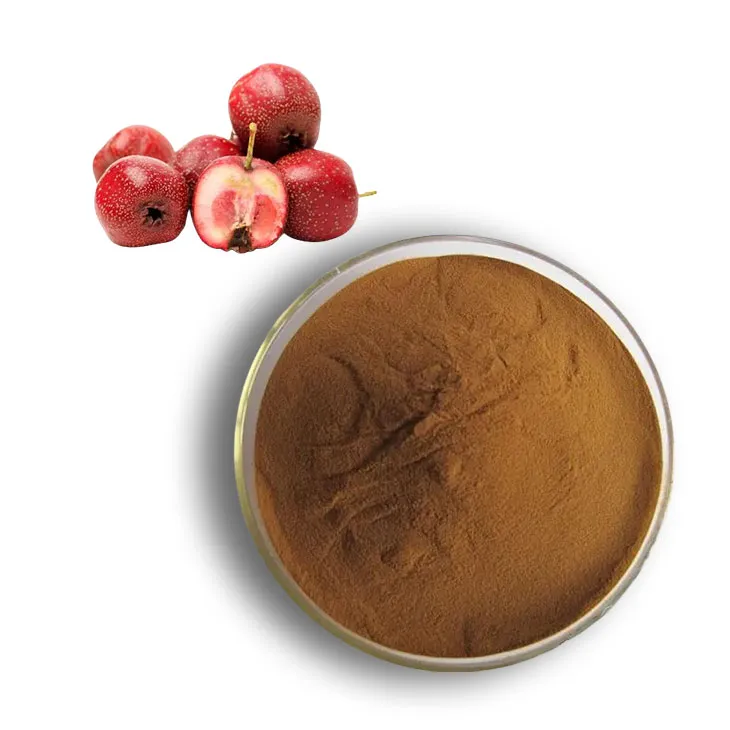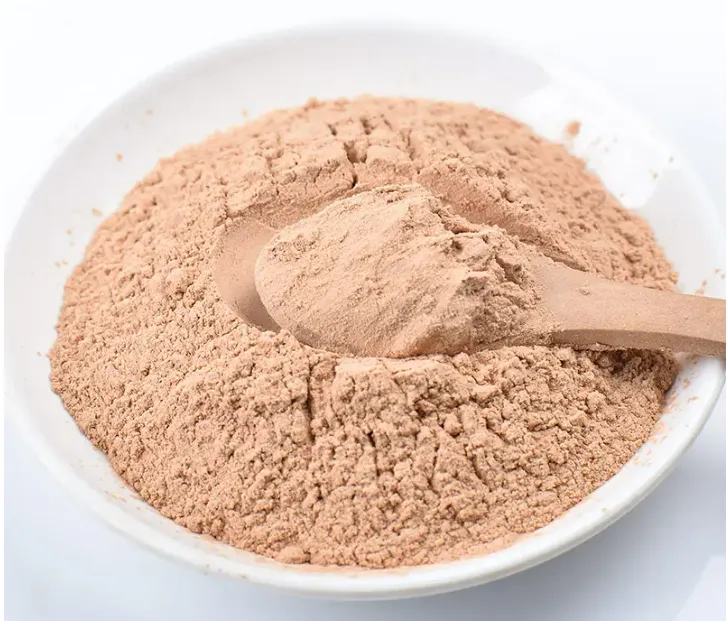- 0086-571-85302990
- sales@greenskybio.com
Understanding the Private Label of Hawthorn Extract: A Comprehensive Guide
2024-12-18

1. Introduction to Hawthorn Extract
Hawthorn Extract is a natural product that has been used for centuries in traditional medicine. Hawthorn (Crataegus spp.) is a shrub or small tree native to temperate regions of the Northern Hemisphere. The extract is typically made from the berries, leaves, or flowers of the hawthorn plant. It contains a variety of bioactive compounds, including flavonoids, proanthocyanidins, and phenolic acids.
These compounds are believed to be responsible for the many health benefits associated with Hawthorn Extract. For example, it has been shown to have cardioprotective effects, such as improving heart function, reducing blood pressure, and lowering cholesterol levels. It may also have antioxidant, anti - inflammatory, and digestive benefits.

2. The Concept of Private Label in Hawthorn Extract
A private label in the context of hawthorn extract refers to a product that is manufactured by one company but sold under another company's brand name. This allows companies to offer hawthorn extract products without having to invest in the research, development, and manufacturing processes themselves.
Private label hawthorn extract products can range from dietary supplements in capsule or tablet form to liquid extracts for use in tinctures or herbal remedies. They can be targeted at different consumer markets, such as those interested in natural health products, cardiovascular health, or general well - being.

3. Production of Hawthorn Extract for Private Label
3.1. Raw Material Sourcing
The quality of the hawthorn extract begins with the sourcing of raw materials. Hawthorn berries, leaves, or flowers are typically harvested from wild or cultivated plants. Sustainable sourcing is becoming increasingly important, as over - harvesting can have a negative impact on the environment and the long - term availability of the plant.
When sourcing raw materials, factors such as the species of hawthorn, the geographical location of growth, and the time of harvest are all considered. Different species may have slightly different chemical compositions, and the quality of the extract can be affected by factors such as soil quality, climate, and altitude.
3.2. Extraction Methods
There are several methods for extracting the active compounds from hawthorn. Solvent extraction is one of the most common methods, where solvents such as ethanol or water are used to dissolve the bioactive compounds from the plant material. This process can be optimized to ensure high yields and purity of the extract.
Another method is supercritical fluid extraction, which uses supercritical carbon dioxide as the solvent. This method has the advantage of being more environmentally friendly and can produce a higher - quality extract with fewer impurities. However, it is also more expensive and requires specialized equipment.
3.3. Quality Control
Quality control is essential in the production of private label hawthorn extract. This includes testing the raw materials for contaminants such as pesticides, heavy metals, and microbial organisms. During the extraction process, the purity and concentration of the active compounds are monitored.
Finished products are also tested for quality and safety. This may include assays for specific bioactive compounds, stability testing, and compliance with regulatory requirements. Quality control ensures that the private label hawthorn extract products meet the highest standards of quality and safety.
4. Applications of Private Label Hawthorn Extract
4.1. Dietary Supplements
One of the most common applications of private label hawthorn extract is in dietary supplements. These supplements are often marketed for their cardiovascular benefits, such as improving heart health, reducing the risk of heart disease, and managing blood pressure.
They can be formulated as single - ingredient supplements or combined with other herbs or nutrients. For example, hawthorn extract may be combined with garlic extract, omega - 3 fatty acids, or vitamin C to enhance its cardioprotective effects.
4.2. Herbal Remedies
In herbal medicine, hawthorn extract is used in various tinctures, teas, and poultices. It can be used to treat a variety of ailments, including indigestion, anxiety, and insomnia. In these applications, the extract is often prepared using traditional methods and may be combined with other herbs for synergistic effects.
For example, a herbal tea may be made from a combination of hawthorn, chamomile, and lemon balm to promote relaxation and digestive health.
4.3. Cosmetics
Hawthorn extract is also finding applications in the cosmetics industry. Its antioxidant and anti - inflammatory properties make it a valuable ingredient in skin care products. It can be used in creams, lotions, and serums to protect the skin from oxidative stress, reduce inflammation, and improve skin elasticity.
Some cosmetics companies are using private label hawthorn extract in their anti - aging and anti - acne products. For example, a face cream may contain hawthorn extract to reduce the appearance of wrinkles and improve skin texture.
5. Regulatory Considerations for Private Label Hawthorn Extract
The production and sale of private label hawthorn extract are subject to various regulatory requirements. In the United States, dietary supplements are regulated by the Food and Drug Administration (FDA) under the Dietary Supplement Health and Education Act (DSHEA).
Under DSHEA, manufacturers are responsible for ensuring the safety and quality of their products. They must also comply with labeling requirements, which include providing accurate information about the ingredients, dosage, and potential benefits and risks of the product.
In the European Union, hawthorn extract is considered a food supplement and is regulated by the European Food Safety Authority (EFSA). EFSA sets standards for the safety, quality, and labeling of food supplements, including those containing hawthorn extract.
6. Marketing and Branding of Private Label Hawthorn Extract
Marketing and branding play a crucial role in the success of private label hawthorn extract products. Companies need to develop a strong brand identity that differentiates their product from competitors.
Product positioning is an important aspect of marketing. For example, a private label hawthorn extract product may be positioned as a high - quality, all - natural alternative to prescription medications for heart health. Marketing messages can emphasize the product's natural origin, purity, and effectiveness.
Packaging also plays a role in marketing. Attractive and informative packaging can attract consumers and communicate the key features and benefits of the product. Packaging may include information about the source of the hawthorn, the extraction method, and the recommended dosage.
7. Consumer Awareness and Education
Consumer awareness and education are essential for the success of private label hawthorn extract products. Consumers need to be informed about the potential benefits and risks of using hawthorn extract.
Manufacturers and marketers can play a role in educating consumers through product labels, websites, and educational materials. For example, a product label may include information about the scientific research behind the product's benefits, as well as any potential side effects or interactions with medications.
Healthcare professionals can also play a role in educating consumers about hawthorn extract. They can provide advice on whether hawthorn extract is appropriate for a particular individual's health needs and how to use it safely.
8. Conclusion
Private label hawthorn extract offers a wide range of opportunities for companies in the health, wellness, and beauty industries. From production to applications, understanding the various aspects of hawthorn extract is crucial for those involved in the private label business.
By ensuring high - quality production, compliance with regulatory requirements, effective marketing, and consumer education, companies can successfully offer private label hawthorn extract products that meet the needs of consumers and contribute to their health and well - being.
FAQ:
What is a private label in the context of hawthorn extract?
A private label in the context of hawthorn extract refers to a product that is manufactured by one company but sold under another company's brand. This allows the selling company to have a unique product in their product line without having to develop the manufacturing process themselves.
What are the main production processes for hawthorn extract?
The production of hawthorn extract typically involves several steps. First, high - quality hawthorn fruits are selected. Then, they are cleaned and dried. After that, extraction methods such as solvent extraction or supercritical fluid extraction may be used to obtain the active compounds from the hawthorn. The extract is then purified and concentrated to the desired potency.
What are the potential health benefits of hawthorn extract?
Hawthorn extract has been associated with several potential health benefits. It may help improve heart health by promoting normal blood pressure, reducing cholesterol levels, and enhancing cardiac function. It also has antioxidant properties that can protect cells from oxidative damage. Additionally, it may aid in digestion and have a calming effect on the nervous system.
How can hawthorn extract be used in different applications?
Hawthorn extract can be used in various applications. In the pharmaceutical industry, it can be formulated into medications for heart - related conditions. In the nutraceutical and dietary supplement industry, it is available as capsules, tablets, or liquid supplements. It can also be used in the cosmetic industry for products aimed at improving skin health due to its antioxidant properties.
What quality control measures are important for hawthorn extract private labels?
Quality control measures for hawthorn extract private labels are crucial. This includes ensuring the source of the hawthorn is reliable and of high quality. During production, strict monitoring of extraction processes, purity, and potency is necessary. Testing for contaminants such as pesticides, heavy metals, and microbial organisms should also be carried out. Additionally, proper packaging and storage conditions need to be maintained to ensure the stability and shelf - life of the product.
Related literature
- Hawthorn Extract: Composition, Pharmacological Activity and Therapeutic Uses"
- "The Production and Quality Control of Hawthorn Extract for Nutraceutical Applications"
- "Hawthorn Extract in Cardiovascular Health: A Review of Current Research"
- ▶ Hesperidin
- ▶ citrus bioflavonoids
- ▶ plant extract
- ▶ lycopene
- ▶ Diosmin
- ▶ Grape seed extract
- ▶ Sea buckthorn Juice Powder
- ▶ Beetroot powder
- ▶ Hops Extract
- ▶ Artichoke Extract
- ▶ Reishi mushroom extract
- ▶ Astaxanthin
- ▶ Green Tea Extract
- ▶ Curcumin Extract
- ▶ Horse Chestnut Extract
- ▶ Other Problems
- ▶ Boswellia Serrata Extract
- ▶ Resveratrol Extract
- ▶ Marigold Extract
- ▶ Grape Leaf Extract
- ▶ blog3
- ▶ blog4
- ▶ blog5
-
Pure 85% Tomentil Extract.
2024-12-18
-
Aguaje Extract
2024-12-18
-
Plantain extract
2024-12-18
-
Polygonum Cuspidatum Extract
2024-12-18
-
Grapefruit Seed Extract Powder
2024-12-18
-
Beetroot Powder
2024-12-18
-
Coix Seed Extract
2024-12-18
-
Curcuma Longa Extract/Turmeric extract
2024-12-18
-
Eyebright Extract
2024-12-18
-
Echinacea Extract
2024-12-18
-
Polygonum multiflorum extract
2024-12-18





















